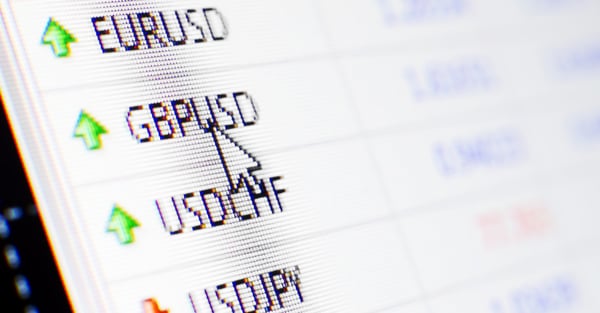Just like any investment vehicle, there are also risks and rewards in Forex trading. After all, both the base currency and denominated currency can appreciate or depreciate, depending on the movement in the foreign exchange (FX) market.
Seasoned traders see such activity as perfectly normal. Beginner investors, on the other hand, might panic. Then, there are those whose expectations are obliterated due to the lack of understanding of the Forex market.
This is where being in the know can benefit traders of all levels. By familiarising yourself with different currency risks, you will be well-equipped to deal with them and even get the upper hand.
In this post, we'll discuss some of the more common risks in the Forex market and what you can do to ensure winning trades.
Before anything else...
Some Forex terms every trader must be familiar with and understand.
Margin Call
This is a notification that you'll receive when you need to top up your trading account to free up more margin. A margin call is also made when you need to close losing positions. The margin is determined by your broker.
Stop-Loss Order
This is basically an order to close a trade if the market price hits the bitter spot or one that points to a clear loss. This is one way to prevent additional losses.
Spread
This refers to the difference between the bid and ask price at which the base currency is sold or bought, accordingly. The spread is how brokers with no commission make money.
Differentials
Or interest rate differential (IRD) is the difference in the interest rates between currencies. If the US Dollar has a 4.50% interest rate, for instance, and the Japanese Yen (JP¥) has 0.10%, the IRD is 4.40%.
Reward-to-Risk Ratio
This measures your expected returns against a predetermined risk of loss. If you expect to make $100 when you buy EUR/USD and then possibly lose $25, then your reward-to-risk ratio is 4:1, a result in dividing the expected profit with the loss that may incur (100/25).
Now, on to the most important part...
Foreign exchange risks you should be aware of…and how to deal with them

Market Risks
Also called systematic risks, these refer to countless risks that are inherent to the entire foreign exchange market because they can affect prices.
These include:
- Inflation
- Changes in tax policy
- Elections
- Employment figures
- Other financial and economical changes
Basically, anything that will cause prices to move around.
While market risks are primarily viewed as detrimental, it is because of the price movements or market volatility that you can profit when trading Forex.
This is why market risks are often considered the most useful to any trader. Volatility either makes you win or lose money, depending on whether the markets go against you.
How can you lower or overcome market risk?
Don't overtrade or risk being on a margin call. It's best that your trades are sized sensibly and made with your funds in mind, which should be sufficient to cover possible losses.
You can also minimise your losses through stop-loss orders. This way, your trade will close at the best price available.
Check out how NOT placing a stop loss is one of the reasons you'll lose money in Forex.
Leverage Risk
Also called margin risk, leverage puts you either at risk or at an advantage. The higher the leverage, the higher the risk in Forex trading.
What makes leverage appealing is the fact that you only need to put aside a small amount for an opportunity to take advantage of greater market exposure.
Imagine 400:1 leverage.
If the market moves in your favour, the returns on your investment are magnified.
If not...
How can you lower or overcome leverage risks?
Always remember that you put yourself at a high level of risk if you use leverage aggressively. You don't always need to use the risky leverage that your broker offers.
Liquidity Risk
With a daily trading volume of USD6.6 trillion in the first quarter of 2020, the Forex market has the highest liquidity in the world. This means it's easier for traders to enter and exit the market--opening and closing trading positions at the expected price.
Still, there are risks during periods of low liquidity, such as during bank holidays or over the weekend. When there isn't much trading going on, prices jump from one small trade to another. This can increase the gapping risk in the market.
How can you lower or overcome liquidity risks?
Because trading hours in Forex span 24 hours and often include the weekend, gap risk is reduced. This allows you to hold positions over the weekend. You just need to be cautious, especially when increasing the size of the spreads.
You should also be on the lookout for instances of higher volatility, which creates trading opportunities with a potential for a higher profit.
Interest Rate Risk
Fluctuations of interest rates will have a significant impact on a country's exchange rate. Interest rates typically increase due to an increase in investments, and the opposite will have consequent effects.
How can you lower or overcome interest rate risk?
Keep up with the changes in interest rates, so you can trade based on differentials.
There are other risks in Forex trading; but did you know that you yourself may potentially increase your risk exposure?
How YOU can be a risk to your trading efforts
While the foreign exchange market has its share of risks, there are management strategies that can be employed. These, however, may not be that effective if you:
- Lack the discipline and commitment to study the market and master it
- Don’t have money management rules that you strictly follow
- Don't stick to a precise trading plan
- Don't trade with a reputable and reliable broker
Trading currencies should be treated like a business that requires commitment. If you don't invest time to study it, you are likely to fail.
It takes time to analyse which trading strategy works best with the type of trader you are. Once you find the winning formula, however, you can profit more from your trades.
How else can you manage currency risks and gain an advantage?

Educate yourself
This should be an ongoing practice whether you're a beginner or an experienced trader. The more you learn, the more you'll be able to navigate the Forex market with ease.
For starters, understand the differences between fundamental analysis and technical analysis. Then, explore other topics that matter to currency trading. There are plenty of reliable resources that you can find online and offline, so make the most of them.
Stay on top of current events
The currency market is often affected by ongoing economic changes both foreign and domestic, thus the need to remain abreast with what's going on in a specific country whose currency you want to trade. This is especially helpful if you use fundamental analysis when strategising your next trade.
Create a trading plan
It's vital that you sign into a trading platform with a definite plan in mind.
- When will you open or close a trade?
- What is your minimum reward-to-risk ratio?
- What percentage of your account are you willing to risk when you trade?
With a trading plan in place, you can clearly define your entry and exit strategies. This results in your ability to stay in control of your gains and losses, which is vital to successful risk management in Forex.
Check out the 10 Golden Rules for Forex Traders to help you create a winning plan for trading currencies.
Manage your emotions
Did you know that your emotions can significantly impact how you approach Forex trading?
Being emotional after losing big, for example, might cause you to make larger trades to recoup what you’ve lost, which also increases your exposure to risk. If you get greedy following a winning streak, you might throw your strategies out the window.
Set realistic profit expectations
In doing so, you:
- Avoid aggressive trading that can result in bigger losses
- Maintain a conservative approach to mitigate risks and receive steady returns
- Know when to exit quickly because all evidence points to a bad trade
- Avoid making poor trading decisions
Practise risk-free
If you're new to the FX market, sign up for a demo account so you can practise trading without losing money. Understanding how the market works without the risks will help you create an effective plan based on your analysis from your demo account.
Get yourself a broker
This is one of the best risk management strategies to employ, especially if you're still unfamiliar with the ins and outs of the Forex market.
A Forex broker can help you:
- Understand the market so you can avoid mistakes
- Get over the initial phase of your trading journey and create a solid foundation
- Make profitable trades
Since brokers trade on your behalf, you don't have to spend a lot of time watching market movements. They also have software and technology in place that monitor market trends and estimate future trends so you can earn maximum profits.
Learn the 7 Rules for Choosing a Forex Broker.
Sign up with Fullerton Markets, a reputable Forex broker with global credibility that offers unparalleled fund safety. We have a world-class infrastructure that enables the execution of trades at lightning speed.
Trade in the world's largest financial market. No better place to start than right here with us! Begin trading with Fullerton Markets today by opening an account:
You might be interested in: A Definitive Guide to Forex Trading for Beginners and the Uninitiated


![How to Better Overcome [or Mitigate] Forex Trading Risks and Profit More](https://www.fullertonmarkets.com/hs-fs/hubfs/man_looking_at_a_blackboard_within_the_words_no_risk_yes.jpg?width=765&height=315&name=man_looking_at_a_blackboard_within_the_words_no_risk_yes.jpg)








